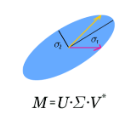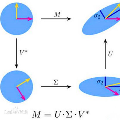This paper presents a randomized quaternion singular value decomposition (QSVD) algorithm for low-rank matrix approximation problems, which are widely used in color face recognition, video compression, and signal processing problems. With quaternion normal distribution based random sampling, the randomized QSVD algorithm projects a high-dimensional data to a low-dimensional subspace and then identifies an approximate range subspace of the quaternion matrix. The key statistical properties of quaternion Wishart distribution are proposed and used to perform the approximation error analysis of the algorithm. Theoretical results show that the randomized QSVD algorithm can trace dominant singular value decomposition triplets of a quaternion matrix with acceptable accuracy. Numerical experiments also indicate the rationality of proposed theories. Applied to color face recognition problems, the randomized QSVD algorithm obtains higher recognition accuracies and behaves more efficient than the known Lanczos-based partial QSVD and a quaternion version of fast frequent directions algorithm.
翻译:本文为低端矩阵近似问题提供了一个随机特异值分解算法(QSVD),这些算法被广泛用于彩色面貌识别、视频压缩和信号处理问题。在基于四氟正常分布随机抽样的情况下,随机的QSVD算法将高维数据投射到一个低维子空间,然后确定四维矩阵的近距离子空间。提出了Wishart 基尼翁分布的关键统计特性,并用于对算法进行近似错误分析。理论结果表明,随机的QSVD 算法可以以可接受的精确度跟踪四面形矩阵的主要单值分解三重物。数字实验还表明拟议理论的合理性。应用于彩色识别问题,随机的QSVD算法获得了更高的识别度,并比已知的以兰佐斯为基础的部分QSVD 和快速频率算法的顶端值更有效率。




